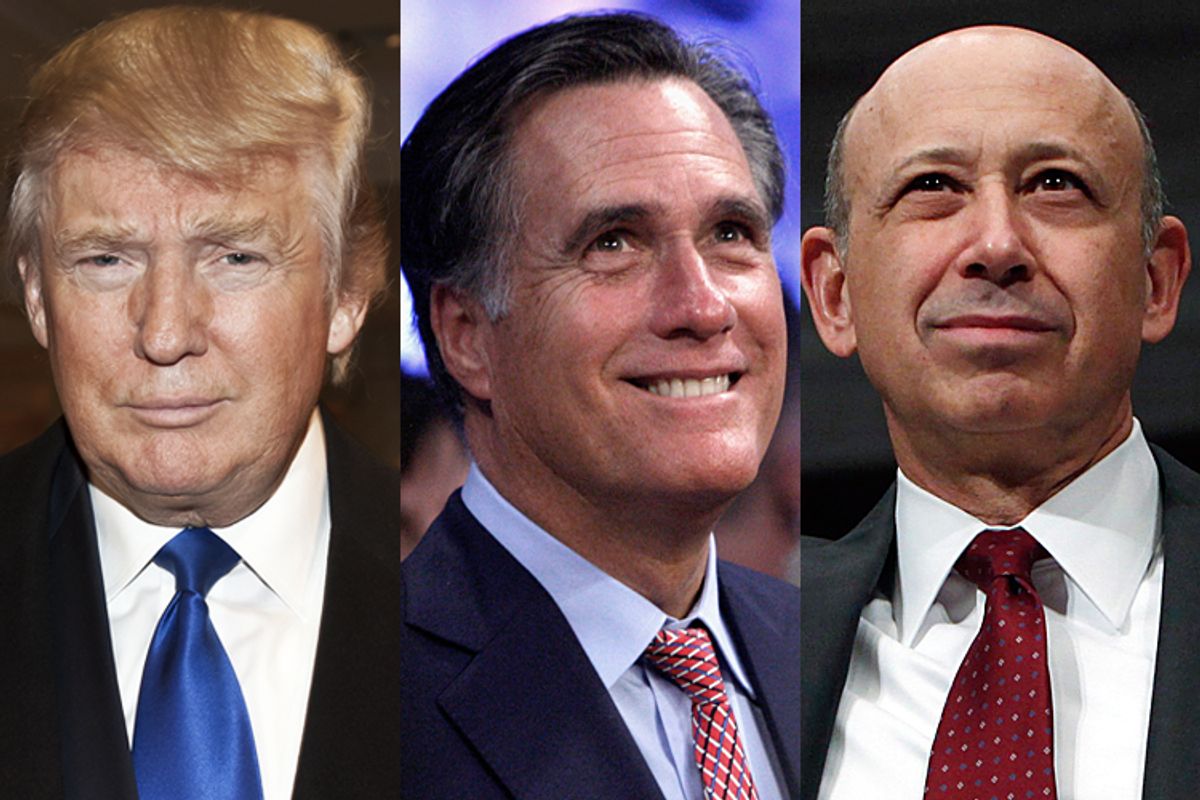In two previous columns, I argued that left and right alike are confused by a failure to distinguish productive businesses that sell innovative goods and services from “rentier” interests — landlords, lenders, copyright holders and others — which use their natural or artificial monopoly power to extract excessive tolls, fees and other recurrent payments from the rest of society, including productive businesses. The fees or rents extracted by these interests constitute a kind of “private taxation” which — rather than public taxation — is the greatest threat facing America’s productive economy.
Today America’s powerful rentier interests, particularly those in the FIRE (finance, insurance and real estate) sector, are mobilizing campaign contributions and paid propaganda to promote what I called the Rentier Agenda: low taxes on those whose income is derived from capital gains; the privatization of public infrastructure and the deregulation of regulated private utilities, to generate windfall profits for investors in privatized or deregulated agencies; and a macroeconomic policy that serves the interests of creditors, at the expense of slow growth and mass unemployment, rather than productive businesses and workers. Similar observations have been made by many on the left and some mavericks on the right.
To counter the domination of America’s rentier oligarchs, we need an Anti-Rentier campaign that would unite unlikely groups: owners of productive businesses as well as workers, populist conservatives and liberal reformers. An Anti-Rentier movement would distinguish businesses that make profits by providing worthwhile goods or services in innovative ways from rentier interests that passively extract exorbitant tolls and fees from the economy without adding any value.
An Anti-Rentier movement would oppose unproductive, ill-begotten wealth, not the rich in general. Wealthy individuals who get richer by investing in start-up companies or funding long-lived, creative blue-chip firms provide a valuable benefit to society, even as they risk losing their own money. Such risk-taking investors are the opposites of financial sector rentiers who seek to bribe policymakers into letting them privatize their gains while socializing their losses.
But government can and should minimize passive rent extraction and unproductive speculation or gambling. The methods for minimizing excessive rents are as various as kinds of rentier interests. Windfall real estate profits should be taxed away by property taxes or “land value” taxes. Severance taxes or superprofits taxes should be levied on energy and other resource windfalls determined by geography rather than human effort. Banks should be low-profit, publicly-regulated utilities and laws against usurious interest rates, struck down in the U.S. in the late twentieth century, should be restored. Infrastructure assets—water systems, electricity, roads, airports and airlines, rail, inland waterways—may be privately-owned utilities, but their prices need to be regulated in the public interest. While there are legitimate roles for both professional associations and labor unions, they should not be allowed to act as predatory labor cartels at the expensive of the economy.
The Anti-Rentier tax agenda would seek to raise capital gains taxes on rentiers while lowering the tax burden on American workers and the profits of productive businesses. The Anti-Rentier policy reform agenda would involve increasing public ownership or utility regulation of infrastructure. Instead of cutting Social Security and Medicare to force the elderly to buy more products from parasitic private-sector monopolies and oligopolies, the Anti-Rentier coalition would favor expanding Social Security and other public social insurance, while phasing out tax subsidies for private health insurance and private retirement products. When it comes to economic management, an Anti-Rentier movement would tolerate a modest amount of inflation, in the interest of productive business and solvent government, at the expense if necessary of the creditor elite. An Anti-Rentier movement would consider using methods used by other governments, such as postal savings banks, public investment banks, and “financial repression” (which isn’t as scary as it sounds) to raise adequate money for government while minimizing blackmail, in the form of high interest rates, imposed by domestic creditors and foreign creditors.
If these Anti-Rentier reforms were undertaken, then genuinely productive American businesses would be freed from many costs imposed on them by the “private parasites” who are far greater threat to its future than America’s public sector. Cutting off excess rents would not only shrink the rentier elite’s share of the U.S. economy, it would also alter the membership of the exclusive club of rich Americans, which would have a much greater percentage of “makers” who got rich by selling new goods and services and a much smaller proportion of “takers” from finance and real estate. The typical rich American should be an innovative industrialist or technologist, not a Wall Street financier or a guy with a parking-meter monopoly. Super-rich bankers would be as rare as super-rich public utility executives.
Americans have tamed rentier industries before. In the early twentieth century, exploitative private power companies were domesticated as regulated public utilities. The Enron scandal, associated with late-twentieth century deregulation, proved the wisdom of the utility regime. And even conservative states like Texas have always levied severance taxes on natural resource monopolies. The challenge of our time is to extend utility-style regulation or public ownership to today’s out-of-control, predatory rentiers in higher education, health care, and — most of all — finance.
Productive Americans of center, left and right, unite! You have nothing to lose but your rents.
This is the third in a three-part series. Read Part 1 and Part 2.



Shares